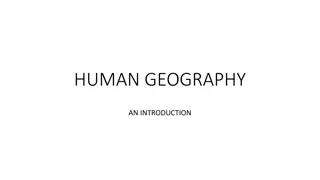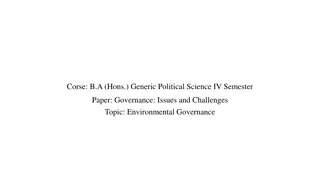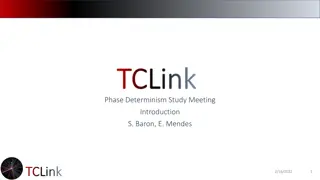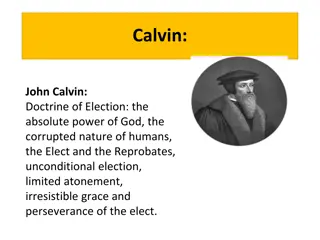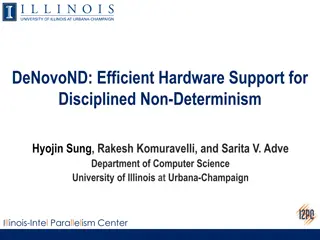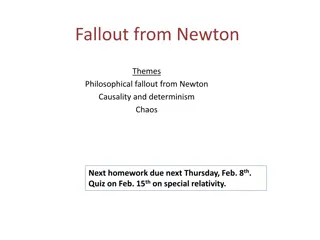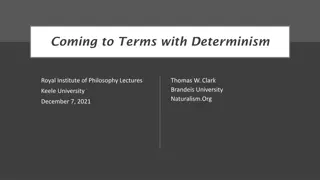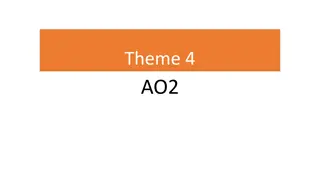Exploring Determinism and Predestination in Ethics
Delve into the implications of predestination and determinism in ethical discussions, pondering scenarios like moral responsibility in various situations. Match thinkers with their theories on determinism, and discover key vocabulary related to the impact of determinism on moral responsibility and predestination on religious belief. Analyze issues related to predestination's influence on our understanding of God, moral responsibility, and free will.
Download Presentation

Please find below an Image/Link to download the presentation.
The content on the website is provided AS IS for your information and personal use only. It may not be sold, licensed, or shared on other websites without obtaining consent from the author. Download presentation by click this link. If you encounter any issues during the download, it is possible that the publisher has removed the file from their server.
E N D
Presentation Transcript
4C The implications of predestination and determinism Why are we studying this in ethics? Think about the following scenarios I drive to Leeds to meet up with friends, on the way home I knock over an elderly lady. a. I order orange juice all night, it was spiked. b. I have two alcoholic drinks and my reflexes are impaired. c. I deliberately drove into the lady, she was annoying me Am I equally to blame in each scenario? If not, why not?
Recap https://www.youtube.com/watch?v=teLoNYvOf90 Watch the clip List three ways it is relevant to our course? Skinner Conditioning Determinism
Match the thinker to the idea Thinker Theory/ Idea 1. Pavlov a. The idea of genetic fixity any attempt to change moral behaviour is useless 2. Skinner b. Empirically illustrated the language difference between soft and hard determinism e.g. the words caused and forced e.g. walking across a room 3. Dennett c. Classical conditioning, conditioned reflexes 4. John Locke d. Identified two types of causes: internal and external. Classical soft determinism claims a moral agent is determined by internal causes but is free from external causes 5. A.J. Ayer e. We are free unless we are forced into actions against our will, like a prisoner in chains is unable to choose to unshackle himself. 6. Thomas Hobbes f. Philosophical determinism free will is just an illusion 7. Hume g. Operant conditioning changes in behaviour are the result of an individual s response to events (Stimuli)
Below is a list of key vocabulary and concepts for both questions. AO1 Essay Either 1. Explain the implications of determinism on moral responsibility Or 2. Explain the implications of predestination on religious belief. Highlight the important terms for your question. 1. Prayer precariis 2. Worth of human ideas of rightness 3. The existence of miracles Miraculum 4. Miracles as an answer to prayer Joshua sun stops in the sky 5. The link between God and evil 6. The value of blaming moral agents for immoral acts 7. Moral responsibility 8. Augustine 9. Spinoza 10. Predestined to sin 11. Massa Peccati 12. James 13. Omnipotence (Johnathon Edwards) 14. Clarence Darrow (Leopold and Loeb) 15. Calvin unconditional election, Council of Dort 16. James Bulger 17. MAOA (genetic mutation) 18. Normative ethics DCT and Utilitarianism 19. Omnibenevolence 20. Arminius God might not be considered the author of all sin.
AO2 Issues for analysis and evaluation will be drawn from any aspect of the content above, such as: A consideration of whether religious believers should accept predestination. The extent to which God predestines humanity. The extent to which philosophical, scientific and/or psychological determinism illustrate that humanity has no free will. Strengths and weaknesses of Hard and/or Soft Determinism. Whether moral responsibility is an illusion. The extent to which pre-destination influences our understanding of God
The extent to which philosophical, scientific and/or psychological determinism illustrate that humanity has no free will. You will be able to answer this better after 4 d, e and f No free will Philosophy - John Locke is right Scientific determinism is right DNA Psychological is right Pavlov Free will The deterministic mechanical view of the world is wrong. Quantum mechanics A fundamental concept in quantum mechanics is hat of randomness, or indeterminancy. In general, the theory predicts only the probability of a certain result Bowie
Strengths and weaknesses of Hard Determinism. Idea Strengths Weaknessess Philosophical Locke s theory of universal causation, if this view is correct then we must be determined. Supported by William James Locke doesn t successfully prove hard determinism, his theory challenges libertarianism but doesn t show determinism is correct. Sartre said there is no God and humanity is condemned to freedom Scientific DNA shows all humans have fixed scientific formula. Dennett genetic fixity Science does not illustrate humanity is predetermined. Dr Sirigu found free will in the parietal cortex of the brain Psychological Pavlov claimed all our actions are conditioned reactions to our environment Psychology does not show humanity is predetermined. Carl Rogers claimed children can be conditioned but through getting in touch with real feelings moral agents can have free will. The cumulative effect of all the arguments Problems with cumulative arguments Flew s leaky bucket analogy
Strengths and weaknesses of Soft Determinism Strengths Hobbes view is supported by Ayer s empirical evidence of the use of language e.g. caused and forced Ayer was a logical positivist not just opinion but supported by evidence (synthetic not meaningless) Easier for humans to accept as we feel free Gives us a moral right to punish people Weaknesses No real distinction between soft and hard determinism Both accept moral agents will is determined wholly by external factors Can t be both free and determined William James a quagmire of evasion
Whether moral responsibility is an illusion. Moral responsibility is an illusion. 1. Hard determinism and predestination 2. Augustine and James 3. Spinoza 4. Philosophical - John Locke sleeping man in a room analogy (Spinoza) 5. Psychological - Skinner 6. Harris what we think of as FW is just luck so not moral responsibility 7. Legal cases and MAOA Moral responsibility is not an illusion. 1. Libertarianism 2. Pelagius God has given humanity FW so humans have moral responsibility 3. Arminius God does not force his will, however, he also claims the Holy Spirit acts as the moral agents moral guide 4. Sartre condemned to freedom 5. Irenaeaus Epistemic distance 6. Dennett we have FW to choose from a limited number of choices 7. Our society punishes law breakers so actions must be done freely
The extent to which pre-destination influences our understanding of God Predestination does not completely influence our understanding of God Predestination completely influences our understanding of God 1. Predestination leads to religious beliefs such as the absolute power and providence of God omnipotent Calvin and Augustine 2. All human beliefs would have been predestined by God, including the belief in God 3. Omnibenevolent -Augustine God is merciful, because He should have predestined everyone to hell but saved some. God is omnibenevolent 4. Miracles Lewis God could intervene to perform miracles to remind humans of his omnipotent nature. 1. Free will illustrates God s omnipotent nature Arminius Holy Spirit in all humanity Can t predestine and be omnibenevolent. Plantinga and the robots God can t respond to prayers for miracles if we are predestined 2. 3. 4. Believers have ideas about God that influence their ideas about predestination God s sovereignity




